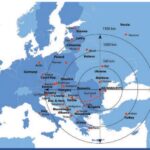Recent Context
Following Benjamin’s Netanyahu’s Monday announcement, we can conclude that Israel has hit “dozens of targets” in Syria against Hezbollah. No further detailed intelligence is known except that the motivation for the attacks was to stop the Shiia non-state actor from acquiring more weapons. The purpose of this analysis is to unravel what’s Israel’s interest in Syria and how can it be applied on the current scenario.

IDF in an military drill operated in Golan Heights.
Wider Context
Since from that start, Israel has followed with large interest the situational developments in Syria, and kept a close eye on the actors involved; mostly on Iran, Damascus, and later on, Russia. All of which gave Jerusalem many reasons to keep its “finger on the trigger”. But in an equal manner, so did most of the Opposition forces, some of them being radical groups with a larger anti-Semitic speech. But the later, doesn’t operate on the southern front, not as much as the pro-Government camp.
Urgent Vulnerabilities:
- Cross-border Security (fire exchange with Hezbollah)
- Internal Security (Hezbollah can boost up ts HAMAS cooperation)
Long Term Vulnerabilities:
- Territorial Integrity: Golan Heights could be re-disputed if Damascus-Hezbollah-Teheran get the upper hand.
- Strategic Regional Position: the same “camp” can isolate and weaken Israel in the Levant region.
Syria Crisis: Jerusalem’s position
Israel would prefer a secular government in Damascus. Not to mention, that in some ways, the current one is fine by them. Even if stronger cooperation with Israel’s biggest enemies, Iran and Hezbollah, can weaken this approval. Another problem is that the Assad dynasty always had problems with the Jewish State, as it repeatedly tried to invade Israel, solo or in co-op with Egypt or other regional Arab partners. It also attacked Israel’s interests in the Lebanon Civil War- an episodic that eventually gave birth to Hezbollah.

PM Netanyahu and IDF Chief of Staff attends a defense meeting near Tel-Aviv (Reuters)
Russia knew very well what was exactly Israel’s position in Syria, thus assuring that Hezbollah will not be armed; additionally setting a Jerusalem-Moscow communication channel to avoid unwanted misunderstandings on the battlefield. This happened back in September, before Putin went in Syria. From this deal, it’s clearly understandable that Russia simply acknowledged that Israel would make raids into Syrian territory, and went as far as setting a framework to accommodate them into doing so, in exchange for Israel’s acceptance for Russian action.
But at the same time, pleasing Israel meant annoying Iran. So Russia also needed to balance this Israel understanding with Iran’s interest, thus not being able to prevent Hezbollah from arming more and more. An effect of this situation was later seen through the high tensions between Israel-Russian in the last months of Moscow’s presences in Syria.
For Israel, the Opposition is barely a solution. First of all, the “opposition’ is not even an umbrella, but a wider concept to call many opposing groups with even deeper opposing ideas, ethnic make-ups or interests, that are also on the losing side for some months- since the Azaz corridor fell. Second of all, Israel doesn’t consider any of those groups secular, even though some of them can be hardly be named as being moderate. They also know that the Kurds are a short-term option and that supporting them would give them bigger partnership problems with other states as Turkey, Iraq or mostly Arab States, than advantages. Even though they recognize that the Kurdish issue resembles very much the Jewish one in Middle East.
Conclusion:
- Tolerating Assad would be the best political decision for Israel.
- Tolerating Assad could also mean accepting the Hezbollah will grow bigger and stronger, making it in the same time, the worst security decision for Israel.
- Fall of pro-Government forces/ Rise of radical groups, could have great consequences on Israel’s Muslim community, thus raising internal security and even border defense to a critical status quo.
- Crisis could extend more to Lebanon as Hezbollah would need a home fight to gain more support and PR as “liberators”.
- Unable to chose a side, Israel knows that as long as they keep on fighting, there will be an uncertainty dominated, but overall “ok” status quo.

Best outcomes:
- The most radical groups as Daesh and Al-Nusra to not only be greatly weaken but also to become sterile.
- Syrian Army to be crippled, with a recovery neediness of decades and the Government with a weak political position and with an overall universal very low legitimacy.
- Unable to forge a higher political situation for Assad, Iranian forces to return empty handed, with a saved territory but a lost administration at Damascus.
- Hezbollah to be downgraded during the war, losing capabilities and gaining heavy casualties.
- Israel to implicate as little, as clandestine, as possible, with purely tactical hits of immediate security needs. Jerusalem to emerge as the most “healthy” and unharmed actor(military, political, economical) from the region.
Importance of Hezbollah’s Downgrade
After the 2006 Israel-Hezbollah war, one of the biggest warfare environmental element identified in the IDF’s reports, was the readiness of the guerilla force and battle versatile. From a “chunk” of guerilla fighters they could maneuver as a regular army, and then, disappear through the civilian population, unseen- total battlefield societal camouflage. These elements are no longer of a non-state actor, but as Daesh, PKK and DPR/ LPR (Ukraine), of a Para-State.
Para-State is the newest terminology calling the new hybrid actors, between State and organizations; not guerilla, not regular armies. A state-like group, structured as an organization that tries to project power and governance.
These qualities gave the paramilitary group the opportunity to operate small-to-medium range missiles capable to hit Haifa and Jerusalem.

The IDF may be the only 21st Century institution that can operate against Para-State actors. So they know that the first step of downgrading such an enemy is to take its conventional capabilities, as medium range missiles, logistics and inter-region movements. That’s why most of the Israel’s targeted subjects in Syria were:
- Weapons caches, most of the air strikes targeted these subjects.
- Transportation routes
- Cross-border activities, as from Lebanon to Syria.
Therefore Israel wants to stop from repeating the summer of 2006 situation, when the IDF was kept in check against Hezbollah. The main objective is keep the Para-State group from arming & equipping itself, both qualitative and quantitative.
Black Swans
The unknown knows. Nasser Taleb’s concept of the power of the uncertainty. We should keep our heads up for unexpected, untraceable actions. Here are some new and important inputs worthy of quantification:
Black Swan: How could Israel react to diplomatic efforts?
Even though I’ve pointed that Israel would prefer to be involved as less as possible, recent events could boost the Jewish State to intervene much more military.
Why? Because big actors have switched on a diplomatic mindset, synchronized with a Regime upper hand on the battlefield:
- The main regional security guarantor, the US, has been slowly taking step backs from military solutions in Syria, and opted for more political ones.
- Russia left Assad in a position to negotiate.
- Political landscape inside-Syria is dominated by a ceasefire, except ISIS and Nusra.
- The ceasefire is a short term strategic pause, not a long term solution. Ceasefire violations are more an more often.
- Diplomatic measures have became 1st hand tools.
This input could be confirmed by the recent huge military exercise of the IDF in Golan Heights as a sign to project power, reaffirm territorial integrity over the Golan Heights, and respond to cross-border fire exchange.
Black Swan: Possible Strategic Cooperation with Egypt and Saudi Arabia
Sisi’s gift to Al-Saud, the two disputed islands from the Red Sea, were initially occupied by Israel when they also conquered Sinai peninsula. The 1978 Camp David accords clearly state that the territories returned to Egypt from Israel, cannot be ceded to other parties.
Jerusalem did not protest nor condemned this action. Furthermore, reports indicate that Israel even gave written approval of actions. There is evidently, something that the Jewish State got in return, except an assurance of free passage from Ryad.

Tiran and Sanafir- the two islands gifted to Saudi Arabia by Egypt.
But when the oil market leader (Saudi Arabia), the owner of the most critical regional infrastructure with global importance (Suez canal, Egypt) teams-up with an emerging gas exporter (Israel) it’s easy to see an energy strategic partnership on the rise.
Black Swan: the Turkish connection
However unlikely, Mossad and the Turkish MIT always had an unconventional cooperation. And while huge diplomatic efforts on Gaza have successfully gotten through, it may become a potential full relation for Jerusalem to joggle with. The normalization of Israeli-Turkish relations can open more doors, thus facilitating a more opened pivotal stance from the Jewish State.
Overall better connections with Sunni states can mean a greater extend towards keeping radical groups in check, and away from Israel’s affairs.
End Notes
Israel will need to find a battlefield balance between the opposing groups and keep the fight gowning for as much as possible it needs so that all of the actors will emerge weaken or destroyed. But as current parallel developments point out, some new connections could facilitate the objective reach.
Founder of T-Intelligence. OSINT analyst & instructor, with experience in defense intelligence (private sector), armed conflicts, and geopolitical flashpoints.





